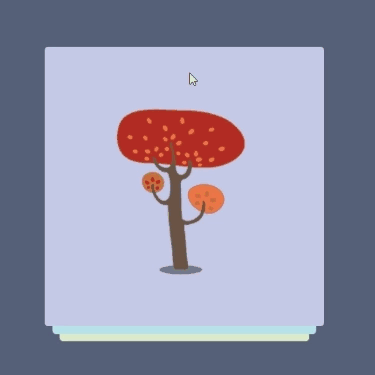基于vue实现探探滑动组件功能
(编辑:jimmy 日期: 2024/12/30 浏览:2)
前言
嗨,说起探探想必各位程序汪都不陌生(毕竟妹子很多),能在上面丝滑的翻牌子,探探的的堆叠滑动组件起到了关键的作用,下面就来看看如何用vue写一个探探的堆叠组件 "text-align: center">
简单归纳下里面包含的基本功能点:
- 图片的堆叠
- 图片第一张的滑动
- 条件成功后的滑出,条件失败后的回弹
- 滑出后下一张图片堆叠到顶部
体验优化
根据触摸点的不同,滑动时首图有不同角度偏移
偏移面积判定是否成功滑出
二. 具体实现
有了归纳好的功能点,我们实现组件的思路会更清晰
1. 堆叠效果
堆叠图片效果在网上有大量的实例,实现的方法大同小异,主要通过在父层设定perspective及perspective-origin,来实现子层的透视,子层设定好translate3d Z轴数值即可模拟出堆叠效果,具体代码如下
// 图片堆叠dom <!--opacity: 0 隐藏我们不想看到的stack-item层级--> <!--z-index: -1 调整stack-item层级"--> <ul class="stack"> <li class="stack-item" style="transform: translate3d(0px, 0px, 0px);opacity: 1;z-index: 10;"><img src="/UploadFiles/2021-04-02/1.png">上面只是一组静态代码,我们希望得到的是vue组件,所以需要先建立一个组件模板stack.vue,在模板中我们可以使用v-for,遍历出stack节点,使用:style 来修改各个item的style,代码如下
<template> <ul class="stack"> <li class="stack-item" v-for="(item, index) in pages" :style="[transform(index)]"> <img :src="/UploadFiles/2021-04-02/item.src">关键点
style可以绑定对象的同时,也可以绑定数组和函数,这在遍历的时候很有用
最基本的dom结构已经构建完毕,下一步是让首张图片“动”起来
2. 图片滑动
图片滑动效果,在很多场景中都有出现,其原理无非是监听touchs事件,得到位移,再通过translate3D改变目标位移,因此我们要实现的步骤如下
- 对stack进行touchs事件的绑定
- 监听并储存手势位置变化的数值
- 改变首图css属性中translate3D的x,y值
具体实现
在vue框架中,不建议直接操作节点,而是通过指令v-on对元素进行绑定,因此我们将绑定都写在v-for遍历里,通过index进行判断其是否是首图,再使用:style修改首页的样式,具体代码如下:
<template> <ul class="stack"> <li class="stack-item" v-for="(item, index) in pages" :style="[transformIndex(index),transform(index)]" @touchstart.stop.capture="touchstart" @touchmove.stop.capture="touchmove" @touchend.stop.capture="touchend" @mousedown.stop.capture="touchstart" @mouseup.stop.capture="touchend" @mousemove.stop.capture="touchmove"> <img :src="/UploadFiles/2021-04-02/item.src">3. 条件成功后的滑出,条件失败后的回弹
条件的触发判断是在touchend/mouseup后进行,在这里我们先用简单的条件进行判定,同时给予首图弹出及回弹的效果,代码如下
<template> <ul class="stack"> <li class="stack-item" v-for="(item, index) in pages" :style="[transformIndex(index),transform(index)]" @touchmove.stop.capture="touchmove" @touchstart.stop.capture="touchstart" @touchend.stop.capture="touchend" @mousedown.stop.capture="touchstart" @mouseup.stop.capture="touchend" @mousemove.stop.capture="touchmove"> <img :src="/UploadFiles/2021-04-02/item.src"><template> <ul class="stack"> <li class="stack-item" v-for="(item, index) in pages" :style="[transformIndex(index),transform(index)]" @touchmove.stop.capture="touchmove" @touchstart.stop.capture="touchstart" @touchend.stop.capture="touchend" @mousedown.stop.capture="touchstart" @mouseup.stop.capture="touchend" @mousemove.stop.capture="touchmove" @webkit-transition-end="onTransitionEnd" @transitionend="onTransitionEnd" > <img :src="item.src">
堆叠滑动效果已经出来了,但是探探在体验上,还增加了触碰角度偏移,以及判定滑出面积比例
角度偏移的原理,是在用户每次进行touch时,记录用户触碰位置,计算出最大的偏移角度,在滑动出现位移时,线性增加角度以至最大的偏移角度。
使用在stack中具体要做的是:
touchmove中计算出所需角度和方向
touchend及onTransitionEnd中将角度至零
判定滑出面积比例,主要通过偏移量计算出偏移面积,从而得到面积比例,完成判断
完整的代码和demo可以在github上查看源码,这里就不贴出来了
以上就是本文的全部内容,希望对大家的学习有所帮助,也希望大家多多支持。
